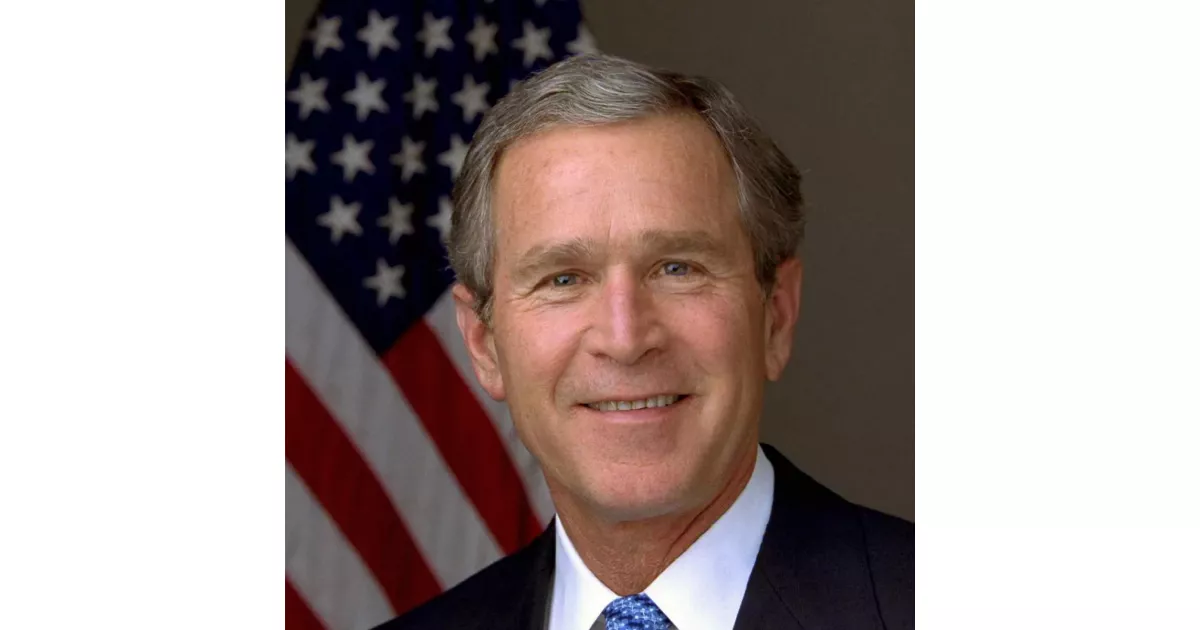A closer look at the most debated and controversial moments involving George W. Bush.
George W. Bush, the 43rd U.S. President (2001-2009), is a Republican politician, businessman, and former U.S. Air Force officer. The son of President George H.W. Bush, he previously served as the 46th Governor of Texas (1995-2000). His presidency was largely defined by the September 11th terrorist attacks in 2001, which led to the launch of the War on Terror, including military interventions in Afghanistan and Iraq. Domestically, he enacted education reform legislation known as No Child Left Behind and signed tax cuts into law. His administration also faced criticism for its handling of Hurricane Katrina and the 2008 financial crisis.
September 4, 1976: Arrested for Driving Under the Influence
On September 4, 1976, George W. Bush was arrested for driving under the influence of alcohol in Kennebunkport, Maine.
1995: Passage of Dickey-Wicker Amendment
Federal funding for medical research involving the creation or destruction of human embryos through the Department of Health and Human Services and the National Institutes of Health has been forbidden by law since the passage of the Dickey–Wicker Amendment in 1995.
1997: Senate Disapproval of the Kyoto Protocol
In 1997, the Senate voted 95–0 on a resolution expressing its disapproval of the Kyoto Protocol.
2000: Won the Presidential Election
In 2000, George W. Bush won the presidential election against Al Gore, despite losing the popular vote and a Supreme Court decision halting a recount in Florida.
August 9, 2001: Executive Order on Stem Cell Research Funding
On August 9, 2001, President Bush signed an executive order that lifted the ban on federal funding for research on the existing 71 "lines" of stem cells. However, the ability of these existing lines to provide an adequate medium for testing has been questioned.
2001: Bush's Tax Cut Plan and Economic Concerns
In 2001, George W. Bush proposed a $1.35 trillion tax cut program, arguing that the surplus was the people's money. Federal Reserve chairman Alan Greenspan warned of a recession, while Treasury Secretary Paul H. O'Neill opposed some tax cuts due to concerns about budget deficits and Social Security.
2001: Opposition to the Kyoto Protocol
Upon taking office in 2001, George W. Bush stated his opposition to the Kyoto Protocol, citing that the treaty exempted 80% of the world's population and would have cost tens of billions of dollars per year.
January 29, 2002: State of the Union Address and the "Axis of Evil"
In his State of the Union Address on January 29, 2002, President Bush asserted that an "axis of evil" consisting of North Korea, Iran, and Ba'athist Iraq was "arming to threaten the peace of the world".
November 2002: UN Weapons Inspectors in Iraq
In November 2002, Hans Blix and Mohamed ElBaradei led UN weapons inspectors in Iraq, but were advised by the U.S. to depart the country four days prior to the U.S. invasion, despite their requests for more time to complete their tasks.
2002: Proposal of the Clear Skies Act of 2003
In 2002, George W. Bush proposed the Clear Skies Act of 2003, which aimed at amending the Clean Air Act to reduce air pollution through emissions trading programs.
March 20, 2003: Invasion of Iraq
On March 20, 2003, the United States, along with the "coalition of the willing", initiated the invasion of Iraq. The Iraqi military was quickly defeated.
2003: Initiation of President's Emergency Plan and Invasion of Iraq
In 2003, George W. Bush initiated the President's Emergency Plan for AIDS Relief and ordered the invasion of Iraq, based on the false belief that Saddam Hussein's regime possessed weapons of mass destruction.
2003: Another Tax Cut Passed
In 2003, another tax cut was passed as the economy showed signs of improvement, though job growth remained stagnant.
2003: Clear Skies Act Failed to Pass
In 2003, the Clear Skies Act failed to make it out of committee in Congress.
2004: Bush's Re-election Campaign
In 2004, George W. Bush campaigned for re-election with broad Republican support. He emphasized commitment to the wars in Iraq and Afghanistan, support for the USA PATRIOT Act, constitutional amendments banning abortion and same-sex marriage, reforming Social Security, creating an ownership society, and opposing mandatory carbon emissions controls. He also proposed a guest worker program for immigrants.
2004: Nomination of Porter Goss and CIA Purge
In 2004, following the resignation of CIA director George Tenet, George W. Bush nominated Porter Goss to head the agency. The White House ordered Goss to purge agency officers who were disloyal to the administration, leading to the firing or resignation of many senior CIA agents. The CIA was also accused of leaking classified information to undermine the 2004 election.
June 2005: Release of Air National Guard Records
In June 2005, the Department of Defense released all records of George W. Bush's Texas Air National Guard service.
2005: Campaigning for Social Security Reform
In 2005, George W. Bush embarked on a national tour, campaigning for his Social Security reform initiative in media events known as "Conversations on Social Security." However, public support declined, and the proposal's legislative prospects were further diminished by political fallout from the response to Hurricane Katrina.
2005: Social Security Reform Initiative
In 2005, George W. Bush outlined a major initiative to reform Social Security, which included partial privatization of the system and personal Social Security accounts. He discussed the potential impending bankruptcy of the program in his 2005 State of the Union Address.
March 2006: Barack Obama on Raising the Debt Ceiling in March 2006
In March 2006, then-senator Barack Obama criticized raising America's debt limit as a sign of leadership failure.
July 19, 2006: First Presidential Veto: Stem Cell Research Enhancement Act
On July 19, 2006, President Bush used his veto power for the first time in his presidency to veto the Stem Cell Research Enhancement Act. The bill would have repealed the Dickey–Wicker Amendment, thereby permitting federal money to be used for research where stem cells are derived from the destruction of an embryo.
August 2006: NSA Surveillance Program Ruled Unconstitutional
In August 2006, a U.S. district court judge ruled that the NSA electronic surveillance program was unconstitutional.
October 17, 2006: Signing of Military Commissions Act
On October 17, 2006, President Bush signed the Military Commissions Act of 2006 into law, allowing the U.S. government to prosecute unlawful enemy combatants by military commission and denying detainees access to habeas corpus while barring torture.
2006: Bush Urges Congress to Allow Illegal Immigrants to Work in the U.S.
In 2006, President Bush urged Congress to allow more than twelve million illegal immigrants to work in the United States with the creation of a "temporary guest-worker program".
2006: Unfavorable opinion in most countries
In 2006, surveys found that most respondents in 18 of 21 countries around the world held an unfavorable opinion of George W. Bush, judging his administration as negative for world security.
January 2007: Troop Surge in Iraq
In January 2007, George W. Bush launched a surge of troops in Iraq.
January 17, 2007: Surveillance Program Subjected to Judicial Oversight
On January 17, 2007, Attorney General Alberto Gonzales informed U.S. Senate leaders that the President would not reauthorize the President's Surveillance Program, but would subject it to judicial oversight.
March 2007: Bush most disliked leader in Arab nations
A March 2007 survey of public opinion in six Arab nations conducted by Zogby International and the University of Maryland found that George W. Bush was the most disliked world leader.
May 1, 2007: Veto of Troop Withdrawal Bill
On May 1, 2007, President Bush vetoed a bill that set a deadline for the withdrawal of U.S. troops from Iraq, insisting that a continued U.S. presence was crucial.
June 2007: Bush Supports Comprehensive Immigration Reform Act of 2007
From May to June 2007, President Bush strongly supported the Comprehensive Immigration Reform Act of 2007, which was written by a bipartisan group of senators with the active participation of the Bush administration. The bill envisioned a legalization program for illegal immigrants, with an eventual path to citizenship.
June 28, 2007: Defeat of Comprehensive Immigration Reform Act in the Senate
On June 28, 2007, the Comprehensive Immigration Reform Act was defeated in the Senate, with a cloture motion failing on a 46–53 vote. President Bush expressed disappointment upon the defeat of one of his signature domestic initiatives.
July 6, 2007: Ruling on NSA Surveillance Program Vacated
On July 6, 2007, the United States Court of Appeals for the Sixth Circuit vacated a U.S. district court judge's ruling that the NSA electronic surveillance program was unconstitutional, on the grounds that the plaintiffs lacked standing.
2007: Veto of State Children's Health Insurance Program (SCHIP) Legislation
In 2007, George W. Bush vetoed State Children's Health Insurance Program (SCHIP) legislation, which would have expanded federally funded healthcare benefits to children of some low-income families and was to be funded by an increase in the cigarette tax. Bush viewed the legislation as a move toward socialized health care.
March 8, 2008: Veto of Intelligence Oversight Bill
On March 8, 2008, President Bush vetoed H.R. 2082, a bill that would have expanded congressional oversight over the intelligence community and banned the use of waterboarding and other interrogation methods, arguing it would remove a valuable tool in the War on Terror.
March 10, 2008: Congress Files Federal Lawsuit over U.S. Attorney Firings
On March 10, 2008, the Congress filed a federal lawsuit to enforce their issued subpoenas related to whether the Justice Department and the White House were using the U.S. Attorney positions for political advantage.
April 2008: Disapproval ratings reach record high
In April 2008, George W. Bush's disapproval ratings reached the highest ever recorded for any president in the 70-year history of the Gallup poll, with 69 percent of those polled disapproving of his job performance.
June 9, 2008: Articles of impeachment introduced against Bush
On June 9, 2008, Representative Dennis Kucinich introduced 35 articles of impeachment against George W. Bush on the floor of the House of Representatives. However, Speaker Nancy Pelosi declared that impeachment was "off the table".
July 31, 2008: Court Ruling on Congressional Subpoenas
On July 31, 2008, a United States district court judge ruled that President Bush's top advisers were not immune from congressional subpoenas.
September 2008: Intensification of the 2008 Financial Crisis
In September 2008, the 2008 financial crisis intensified with the Federal takeover of Fannie Mae and Freddie Mac, the bankruptcy of Lehman Brothers, and a federal bailout of American International Group for $85 billion.
December 2008: Shoe-Throwing Incident in Iraq
During President Bush's last visit to Iraq in December 2008, Iraqi journalist Muntadhar al-Zaidi threw both of his shoes at him during a press conference, yelling that they were a "farewell kiss" for the victims of the war.
2008: Criticism of Bush's handling of the 2008 financial crisis
Critics often point to George W. Bush's handling of the 2008 financial crisis as proof that he was unfit to be president.
2008: Low approval ratings before election
In the fall of 2008, just before the election, George W. Bush's approval ratings remained at record lows of 19 to 20 percent, while his disapproval ratings ranged from 67 percent to as high as 75 percent.
2009: Final job approval rating
In polling conducted January 9–11, 2009, George W. Bush's final job approval rating by Gallup was 34 percent, which placed him on par with Jimmy Carter and Harry S. Truman.
March 2010: Report on False Pretenses for Iraq War
In March 2010, the Center for Public Integrity released a report stating that President Bush's administration had made over 900 false claims in a two-year period about the threat of Iraq to the United States, as a rationale to engage in war in Iraq.
November 9, 2010: Release of "Decision Points"
On November 9, 2010, George W. Bush released his memoirs, titled "Decision Points." During a pre-release appearance, Bush identified keeping the country safe as his biggest accomplishment and failing to secure Social Security reform as his greatest failure. He also defended his administration's enhanced interrogation techniques, including the waterboarding of Khalid Sheikh Mohammed.
2010: Conclusion of Justice Department Investigation into Attorney Firings
In 2010, the Justice Department investigator concluded that though political considerations did play a part in as many as four of the attorney firings, the firings were "inappropriately political" but not criminal. There was insufficient evidence to pursue prosecution for any criminal offense.
2011: Criticism of Troop Withdrawal from Iraq
In 2011, George W. Bush vocally disagreed with President Obama's withdrawal of U.S. troops from Iraq, calling it a "strategic blunder".
June 2013: PRISM Program Revealed
In June 2013, The Washington Post and The Guardian published reports revealing the existence of PRISM, the NSA's replacement for the President's Surveillance Program.
June 12, 2015: Comments on ISIS and Iraq
In an interview published on June 12, 2015, by Israel Hayom magazine, George W. Bush stated that "boots on the ground" would be necessary to defeat ISIS. He also defended his decision to send additional troops to Iraq during his presidency to defeat Al Qaeda.
June 1, 2020: Statement on the Murder of George Floyd
On June 1, 2020, George W. Bush released a statement addressing the murder of George Floyd and the subsequent nationwide reaction and protests, expressing anguish and concern over racial injustice.
January 6, 2021: Condemnation of U.S. Capitol Attack
On January 6, 2021, following the U.S. Capitol attack, George W. Bush released a statement condemning the violence, comparing it to how election results are disputed in a banana republic and echoing president-elect Biden's message that it was an "insurrection."
July 14, 2021: Reaffirmation of Opposition to Troop Withdrawal from Afghanistan
During an interview with Deutsche Welle on July 14, 2021, George W. Bush reaffirmed his opposition to President Biden's withdrawal of American troops from Afghanistan, calling the plan "a mistake."
Mentioned in this timeline

Donald John Trump is an American politician media personality and...

Michelle Obama an American attorney and author served as the...

Barack Obama the th U S President - was the...

Bill Clinton the nd U S President - served as...
Ukraine is a country in Eastern Europe the second-largest on...

Joe Biden is an American politician who served as the...
Trending
51 minutes ago Tim NeCastro Announces Retirement as Erie Insurance CEO After 10 Years

3 hours ago Apple MacBook Pro: Touchscreen, Dynamic Island, and New Interface Coming Soon.

3 hours ago Microsoft and SpaceX Starlink Partner to Empower Global Community Internet and AI Economy
52 minutes ago Trump Announces Energy Deals and Rate Payer Protection Pledges at SOTU
3 hours ago Whitefox & Fluid Quip collaborate; Low-carbon ethanol boosted; Indoor plants aid climate resilience.

2 hours ago Ethereum Price Faces Resistance at $1,950 Amidst Market Repricing Concerns.
Popular

Jesse Jackson is an American civil rights activist politician and...

Susan Rice is an American diplomat and public official prominent...

Barack Obama the th U S President - was the...

Michael Joseph Jackson the King of Pop was a highly...

XXXTentacion born Jahseh Dwayne Ricardo Onfroy was a controversial yet...

Bernie Sanders is a prominent American politician currently serving as...

